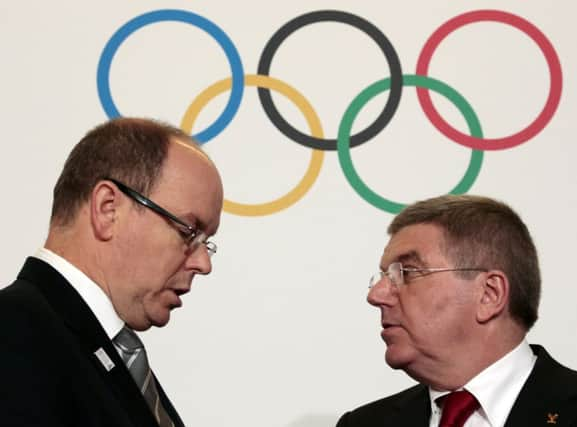Olympics to introduce new sports


The IOC will give greater flexibility to the Olympic programme to allow host cities to stage new sports – there have been calls to bring in sports such as surfing that have greater appeal to young people. It could also pave the way to baseball/softball and possibly squash and karate being included in the Tokyo 2020 Games.
However, the number of athletes will be capped at 10,500, meaning that there will be pressure on the bigger sports such as track and field and swimming to agree to a cut in the number of events.
Advertisement
Hide AdAdvertisement
Hide AdCanada’s IOC member Dick Pound identified triple jump, synchronised swimming and race-walking as events he believes should be dropped.
Sebastian Coe, head of the British Olympic Association and IAAF vice-president, hit back, saying: “Triple jump is a sacrosanct sport in track and field.”
Lord Coe also defended race-walking but conceded there will now be pressure on athletics, saying: “There are roughly 10,500 athletes in an Olympics and we take roughly 2,200 – a fifth of all competitors and 47 different disciplines. Does that mean track and field needs to be vigilant about protecting its events then the answer is almost certainly ‘yes it will’.”
Other IOC members believe the situation with swimming, which allowed Michael Phelps to win eight gold medals in one Games in 2008, needs to be reformed.
Julio Maglione, president of swimming’s international federation FINA, said: “I don’t know what will happen, this is the truth, it’s a difficult moment.
CONNECT WITH THE SCOTSMAN
• Subscribe to our daily newsletter (requires registration) and get the latest news, sport and business headlines delivered to your inbox every morning
“I suppose that it’s a problem we discuss in the future, we don’t know what’s going to happen with us, athletics, gymnastics.”
In other rule changes – part of the greatest shake-up in the Olympics since 1999 – it was agreed that Games can be staged in more than one city or even in different countries in the future.
Advertisement
Hide AdAdvertisement
Hide AdThe 127th IOC session meeting in Monaco yesterday passed recommendations on bidding for Games despite concerns being expressed that the changes could damage the atmosphere of the Olympics.
The new rules will also make it less costly for cities to bid to host Games with the IOC picking up the bill for some of the costs.
The rules were passed unanimously but there were some concerns expressed by IOC members about holding Olympics in different cities or countries.
Denis Oswald, the Swiss IOC member who oversaw the preparations for London 2012, said: “I am worried that the unique character of the Games could be diminished by the recommendation to allow some events to be dispersed over several locations within the same country, or even in a neighbouring country.
“The Olympic village won’t look the same and for isolated athletes it will resemble more a kind of world championship without living a true Olympic experience.”
IOC vice-president John Coates, who presented the changes to bidding rules, said holding events outside the host city or country would only be considered in “exceptional circumstances”.
Meanwhile, suggestions that some summer events could be held during the winter Olympics have been dismissed by the IOC.
Brian Cookson, the president of cycling’s governing body UCI, was among those calling for a radical overhaul of the Olympics, with indoor sports such as track cycling, judo and badminton possibly moving to the Winter Games.
Advertisement
Hide AdAdvertisement
Hide AdThe IOC also agreed to maintain an age limit of 70 for IOC members – with a few limited exceptions permitted. In February, FIFA president Sepp Blatter called the limit “discrimination” and the 78-year-old now faces having to step down from the IOC in 2016 when he reaches the limit of 80 for members elected before 1999. Blatter was in Monaco but did not challenge the proposal on this occasion.
Speaking afterwards, Blatter said he did not oppose the age limits this time as he had already made his point.
“I am a team player, I am in the IOC team and I accept what was proposed,” he said. Asked why FIFA had decided against age limits, Blatter replied: “In FIFA we have another team.”
It meant that all 40 proposals put forward as part of the Olympic Agenda 2020 were voted for unanimously and IOC president Thomas Bach told a news conference this would go down as a historic day for the Olympic movement.
Bach said: “Not in my wildest dreams did I expect this to happen so easily. I hope in 20 years I can look back to this day with satisfaction and happiness and maybe with a little bit of relief.”
Coe, meanwhile, said athletics is in “very, very difficult times” as it investigates allegations of widespread doping and cover-ups in Russia. “You have to say that the scope and scale of these allegations takes it beyond simply a competitor deciding to step beyond the moral boundary,” said Coe.
“This is not in every country of the world, there are 213 federations. But you do have to say a disproportionate amount of the reputational damage is in a relatively small number of countries, and I think we have to recognise this.”
Coe, a double Olympic gold medallist, said he had watched the second part of the German TV documentary which has made the allegations. The programme by ARD-TV alleges doping and corruption which extends beyond Russia and implicates the IAAF in covering up the problem.
Advertisement
Hide AdAdvertisement
Hide Ad“They are very serious allegations,” added Coe. “The very fact that the allegations are in the public domain means that they are serious. So, we have to be very clear that this is a very, very difficult time for our sport.”
SCOTSMAN TABLET AND IPHONE APPS